The AMD 3rd Gen Ryzen Deep Dive Review: 3700X and 3900X Raising The Bar
by Andrei Frumusanu & Gavin Bonshor on July 7, 2019 9:00 AM EST** = Old results marked were performed with the original BIOS & boost behaviour as published on 7/7.
Benchmarking Performance: Web Tests
While more the focus of low-end and small form factor systems, web-based benchmarks are notoriously difficult to standardize. Modern web browsers are frequently updated, with no recourse to disable those updates, and as such there is difficulty in keeping a common platform. The fast paced nature of browser development means that version numbers (and performance) can change from week to week. Despite this, web tests are often a good measure of user experience: a lot of what most office work is today revolves around web applications, particularly email and office apps, but also interfaces and development environments. Our web tests include some of the industry standard tests, as well as a few popular but older tests.
We have also included our legacy benchmarks in this section, representing a stack of older code for popular benchmarks.
All of our benchmark results can also be found in our benchmark engine, Bench.
WebXPRT 3: Modern Real-World Web Tasks, including AI
The company behind the XPRT test suites, Principled Technologies, has recently released the latest web-test, and rather than attach a year to the name have just called it ‘3’. This latest test (as we started the suite) has built upon and developed the ethos of previous tests: user interaction, office compute, graph generation, list sorting, HTML5, image manipulation, and even goes as far as some AI testing.
For our benchmark, we run the standard test which goes through the benchmark list seven times and provides a final result. We run this standard test four times, and take an average.
Users can access the WebXPRT test at http://principledtechnologies.com/benchmarkxprt/webxprt/
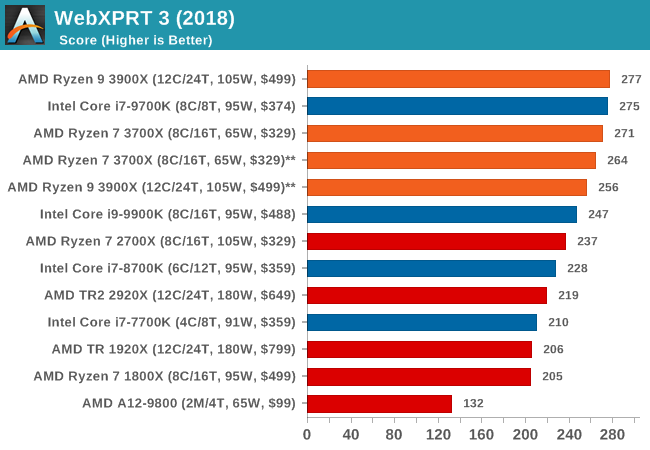
WebXPRT 2015: HTML5 and Javascript Web UX Testing
The older version of WebXPRT is the 2015 edition, which focuses on a slightly different set of web technologies and frameworks that are in use today. This is still a relevant test, especially for users interacting with not-the-latest web applications in the market, of which there are a lot. Web framework development is often very quick but with high turnover, meaning that frameworks are quickly developed, built-upon, used, and then developers move on to the next, and adjusting an application to a new framework is a difficult arduous task, especially with rapid development cycles. This leaves a lot of applications as ‘fixed-in-time’, and relevant to user experience for many years.
Similar to WebXPRT3, the main benchmark is a sectional run repeated seven times, with a final score. We repeat the whole thing four times, and average those final scores.
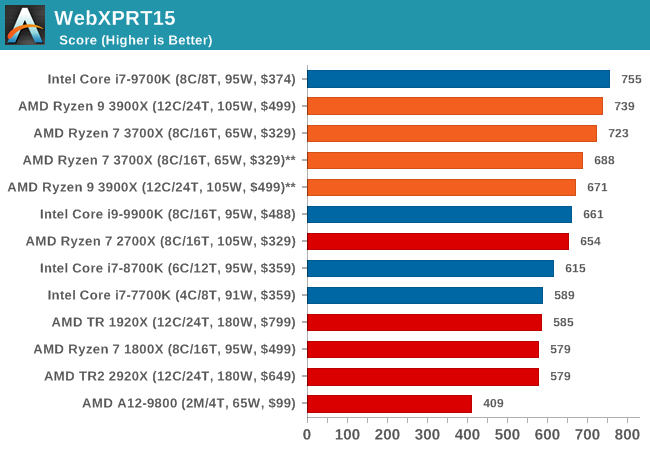
Speedometer 2: JavaScript Frameworks
Our newest web test is Speedometer 2, which is a accrued test over a series of javascript frameworks to do three simple things: built a list, enable each item in the list, and remove the list. All the frameworks implement the same visual cues, but obviously apply them from different coding angles.
Our test goes through the list of frameworks, and produces a final score indicative of ‘rpm’, one of the benchmarks internal metrics. We report this final score.
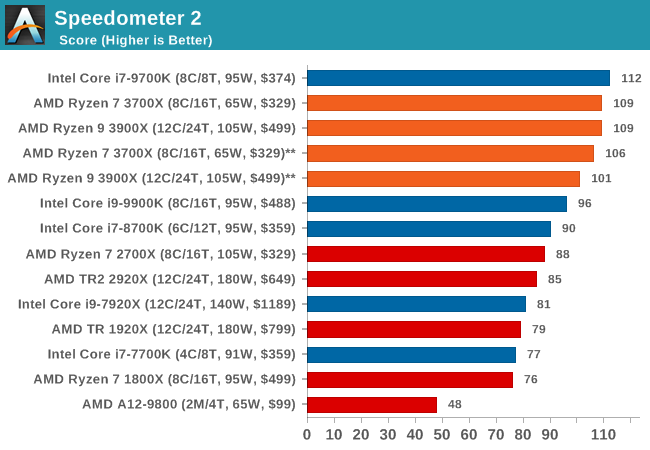
Google Octane 2.0: Core Web Compute
A popular web test for several years, but now no longer being updated, is Octane, developed by Google. Version 2.0 of the test performs the best part of two-dozen compute related tasks, such as regular expressions, cryptography, ray tracing, emulation, and Navier-Stokes physics calculations.
The test gives each sub-test a score and produces a geometric mean of the set as a final result. We run the full benchmark four times, and average the final results.
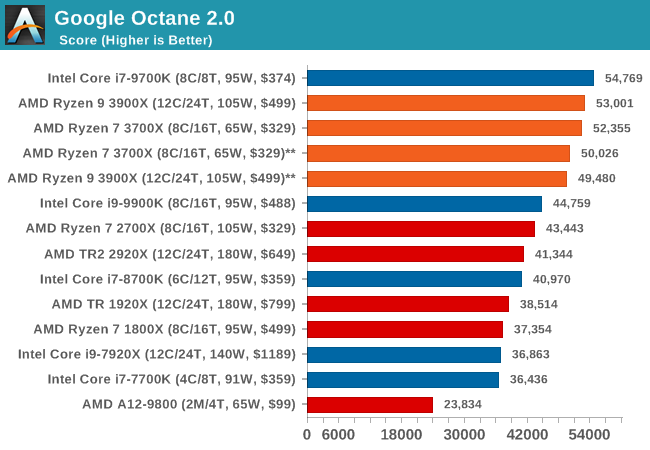
Mozilla Kraken 1.1: Core Web Compute
Even older than Octane is Kraken, this time developed by Mozilla. This is an older test that does similar computational mechanics, such as audio processing or image filtering. Kraken seems to produce a highly variable result depending on the browser version, as it is a test that is keenly optimized for.
The main benchmark runs through each of the sub-tests ten times and produces an average time to completion for each loop, given in milliseconds. We run the full benchmark four times and take an average of the time taken.
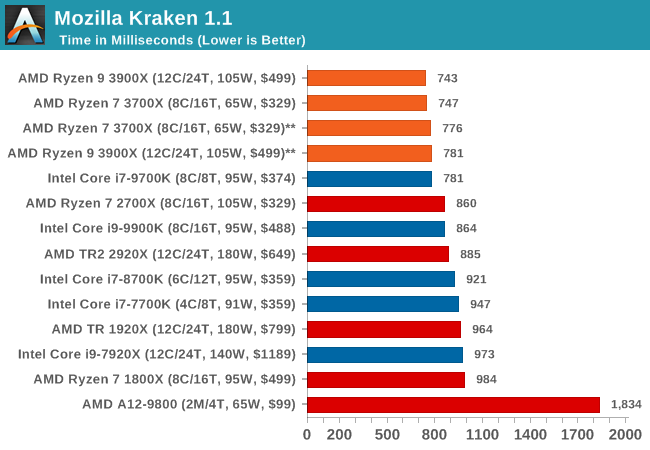
Web Tests Analysis
Overall, in the web tests, the new Ryzen 3900X and 3700X perform very well with both chips showcasing quite large improvements over the 2700X.
We’re seeing quite an interesting match-up against Intel’s 9700K here, which is leading all of the benchmarks. The reason for this is that SKU has SMT turned off. The singe-threaded performance advantage of this is that the CPU core no longer has to share the µOP cache structure between to different threads, and has the whole capacity dedicated to one thread. Web workloads in particular are amongst the most instruction pressure heavy workloads out there, and they benefit extremely from turning SMT off on modern cores.
Whilst we didn’t have the time yet to test the new 3900X and 3700X with SMT off, AMD’s core and op cache works the same in that it’s sharing the capacity amongst two threads, statically partitioning it. I’m pretty sure we’d see larger increases in the web benchmarks when turning off SMT as well, and we’ll be sure to revisit this particular point in the future.










447 Comments
View All Comments
Korguz - Monday, July 22, 2019 - link
Maxiking, and HOW LONG till intel gets the SAME treatment?? saying a processor uses x watts, but in reality uses 50 to 100 watts MORE isnt FRAUD ??? hell you confine intels cpus to the watts they state, and their performance goes DOWN THE TOILET !!!. again .. you KEEP saying AMD is a fraud, but you STILL refuse to admit, that intel is a fraud as well..does this guy even acknowlege the issue with intel and the amount of power they " say " their cpus use, and how much power they REALLY use ??
Korguz - Monday, July 22, 2019 - link
further.. intel doesnt do any marketing, cause they DON'T want the general average user to know the cpu they bought, uses MORE power then has been stated, THAT also is false advertising, come on maxiking, go after intel as well, the same same things you are accusing amd of...Maxiking - Tuesday, July 23, 2019 - link
You are uneducated, TDP doesn't mean power consumption but the amount of heat dissipated, it informs you how much of heat the cooler must be able to dissipate in order to keep the cpu cool enough to run.Get it? 1700x TDP was 95W yet there were tasks it managed to consume 120 or even 140w on stock settings. Like do you even watch reviews? It was the same with 2700w.
but mimimimimimi AMD good mimimimimi Intel bad
Korguz - Tuesday, July 23, 2019 - link
sorry dude.. but YOU are uneducated, amd stays A LOT closer to its stated TDP then intel does, AT even did a review on it. power dissipated, also relates to power used. but it also doesnt help, that amd and intel both use the term TDP differently. either way.. intel uses more power then amd does.https://www.anandtech.com/show/13544/why-intel-pro...
Maxiking - Tuesday, July 23, 2019 - link
Again, TDP is not power consumption and it refers to a cooler.You are uneducated and fabricating because you are an amd fanboy. No one really cares about what is more accurate or not, because it does not say anything about power consumption of the chip.
So keep living in your nice little bubble. It is not my fault that you and other sites have been thinking that TDP -> power consumption. I will share something new to you again.. Ever heard about that Frankenstein novel? Frankenstein in not the monster but the doctor, his surname..Shocking I KNOW!!!
mimimimimimi AMD good mimimimimi Intel bad
Korguz - Tuesday, July 23, 2019 - link
again.. TDP, or Thermal Design Power, does relate to power consumption and how much is needed to keep something cool. You are uneducated and fabricating because you are an intel fanboy. i also notice you like to throw personal insults around when someone disagrees with you, or to try to make your opinion valid. so you keep living in your nice little bubble as well, not my fault you dont understand TDP relates to how much power something uses, as the more power a product uses, the more heat it creates, and then, needs to be removed.mimimimimimi intel good mimimimimi amd bad
Maxiking - Thursday, July 25, 2019 - link
What you just did it is just sad. it shows you are little kid.TDP is not power consumption, if TDP - 100% power consumption, it would mean that 100% of the electrical energy is converted into thermal energy so yeah which is impossible it would mean perpetuum mobile you twat, actually the cpu would be net positive, it would convert 100% of electrical energy into thermal whilst managing to perform another task at no energy cost.
Breaking the laws of physics just because of your AMD fanboyism
Korguz - Thursday, July 25, 2019 - link
i said it RELATES to power consumption, what, you cant read ?? cant see passed your intel bias ?? the more power something uses, the more heat it generates, and there for, the more needs to be dissipated, and i also never said anything about 100% power consumption, pulling words and making things up to try to make your self sound right ? And you are calling me names on top of that, who's the kid here ???Maxiking - Tuesday, July 23, 2019 - link
You are uneducated, TDP doesn't mean power consumption but the amount of heat dissipated, it informs you how much of heat the cooler must be able to dissipate in order to keep the cpu cool enough to run.Get it? 1700x TDP was 95W yet there were tasks it managed to consume 120 or even 140w on stock settings. Like do you even watch reviews? It was the same with 2700w.
but mimimimimimi AMD good mimimimimi Intel bad
Qasar - Tuesday, July 23, 2019 - link
hmmm doest really say amd is being fraudulent, just doesnt like the idea the chips might not boost, or run at what AMD says, but didnt mention fraud...and Korguz has a point.. WHY arent you commenting about the power intels cpus use, vs what intel says they use ?